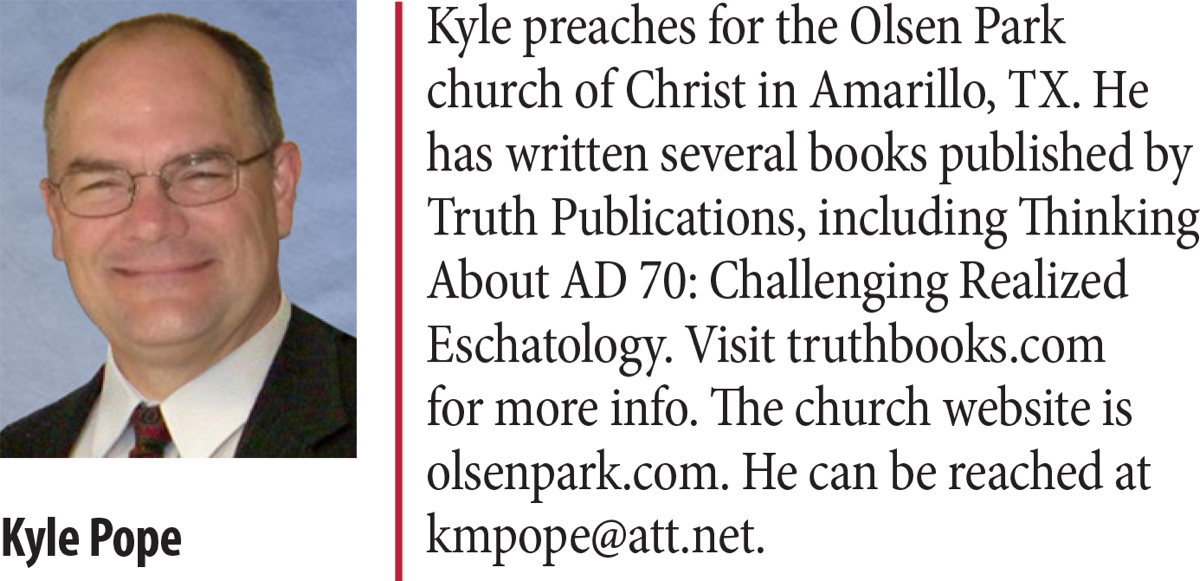By Kyle Pope
Synopsis: Benevolence is both an individual and collective responsibility of Christians. By examining relevant passages, Kyle answers criticisms that are occasionally raised by those who see no difference between these two realms.
Some who are critical of churches that oppose financial support of human charitable organizations out of the Sunday collection (because they believe it is unscriptural) often raise the charge that Christians in these congregations are “doing nothing” to help those in need. The question I would ask when we hear that accusation is, “How do you know?”
In the Sermon on the Mount, Jesus addressed charitable giving. He was critical of those who did their “charitable deeds before men, to be seen by them” (Matt. 6:1, NKJV). He commanded His disciples when giving not to “sound a trumpet” about it “in the synagogues and in the streets, that they may have glory from men” (Matt. 6:2a). Instead, using a personified hyperbole, Jesus taught, “When you do a charitable deed, do not let your left hand know what your right hand is doing” (Matt. 6:3). Let’s consider what Jesus teaches here in light of the charge that some churches are “doing nothing” to help those in need.
Personification is the figure of speech that attributes personal and conscious actions to inanimate objects. Our hands are not inanimate, but they can not think and perceive on their own. The mind controls the actions of the hands. The eyes, ears, nose, tongue, skin, and nerves inform the entire body as a whole. The hand cannot literally “know” anything, and unless it is severed from the body, it cannot do something hidden from the rest of the body. Hyperbole is a figure of speech that states something outside of the realm of what is literally possible in order to emphasize a point. Jesus uses both figures of speech in this text. If one hand could act without the knowledge of the other, there could be no suggestion that one hand was seeking personal glory. It should be the same with charitable giving. To prevent any question about the motives of a person’s giving, disciples of Christ should keep it as private as if one hand could hide its actions from the other.
Christians are to be people who are charitable and compassionate. We are not to pass by “on the other side” (Luke 10:31-32) when we see those in need. We must not say “depart in peace, be warmed and filled” when we see the needy without giving “them the things which are needed for the body” (Jas. 2:16). The love of God does not abide in us if we have “this world’s goods,” yet shut up our hearts to those “in need” (1 John 3:17). Instead, the true follower of Christ must “do good to all, especially to those who are of the household of faith,” acting “as we have opportunity” (Gal. 6:10).
That doesn’t mean we don’t use good judgment in how we give. Can I give everything I have to the poor yet fail to provide for my own family? No! “If anyone does not provide for his own, and especially for those of his household, he has denied the faith and is worse than an unbeliever” (1 Tim. 5:8). Can I give so much to others that I am unable to fulfill commitments that I have made? No! Jesus said, “let your ‘Yes’ be ‘Yes,’ and your ‘No,’ ‘No.’ For whatever is more than these is from the evil one” (Matt. 5:37). Can I give to the addict or alcoholic money to fuel those sins? No! Paul taught that we must not “share in other people’s sins” (1 Tim. 5:22). Can I foster someone’s unwillingness to work? No! When Christians in Thessalonica refused to work while seeking help from the church, Paul taught, “If anyone will not work, neither shall he eat” (2 Thess. 3:10). All of these principles must regulate our giving.
The charge that congregations are “doing nothing” to help those in need usually stems from several false assumptions:
The Greek word translated “alms” (Matt. 6:2, KJV, ASV, NASB) or “charitable deed” (NKJV) is eleēmosunē, drawn from the word for “mercy”—i.e., “merciful deeds” (GLT). Nothing about the word demands that it involves an organized public collective activity. It was used of the lame man who sat at the Beautiful Gate asking “alms from those who entered the temple” (Acts 3:2; cf. 3:3). It was used of Dorcas who was “full of good works and charitable deeds” (Acts 9:36). It was used of Cornelius who “gave alms generously to the people” (Acts 10:2; cf. 10:4, 31) and Paul who came to Jerusalem “to bring alms and offerings” to his nation (Acts 24:17). It involved individual acts of kindness and generosity. It is our world that imagines that only collective organized public activities can truly help those in need. This is not true and leads us to assume that Christians who do what Paul, Cornelius, and Dorcas did were “doing nothing.”
Acting within the authority of Scripture means that we do what we can read about in the Bible and refrain from doing what we cannot find therein. The record of Scripture is that local churches obtained money for their works from a voluntary freewill “collection for the saints” on Sunday (1 Cor. 16:1-2). Churches in the New Testament used these funds for the support of preaching (Phil. 4:15-18), support of elders who labored in the word (1 Tim. 5:17), support of qualified widows (1 Tim. 5:3-16), and the relief of needy saints (Acts 11:28-20). It may also be inferred that if the church is commanded to do something, it is authorized to use funds that are required to obey that command (e.g., the Lord’s Supper, assembling, etc.). There is no command, example, or necessary inference that the church used funds from this collection to support any human organization. There is no command, example, or necessary inference that the church used funds from this collection to help needy non-Christians. To support human organizations, or needy non-Christians, from the “collection for the saints” is unscriptural. Does that mean that churches who respect these biblical teachings are “doing nothing” to help those in need? No. Individual Christians can (and do) choose from their own funds to support human organizations which they consider worthy. Individual Christians can (and do) help needy non-Christians using their own resources. When they do these things as Jesus taught, the “left hand” will not know what “the right hand is doing,” but that is far from “doing nothing.”
The problem Jesus addressed in Matthew 6:1-4 was not neglect of those in need. His concern in that text was motive and approach. He warned that doing these things “before men, to be seen by them” can result in “no reward from your Father in heaven” (6:1). These public displays “in the synagogues and in the streets” seek “glory from men,” and that is the only “reward” they will bring (6:2). In contrast, the approach Jesus teaches allows deeds done “in secret” to be observed by the God who “sees in secret” with the promise that He will “reward you openly” (6:4).
The critic tells us that man-made public organized collective charitable efforts by churches to help the needy “glorify God,” “show the world our love,” “help bring people to Christ,” and “address rather than ignore those in need.” If so, why don’t we see them taught in Scripture? Jesus said, “the poor you have with you always” (John 12:8; cf. Matt. 26:11; Mark 14:7). There were far more people in poverty in biblical times than today. Why wouldn’t Jesus command all the methods and programs we see today if they truly are the best solution? Individual charitable deeds done “in secret” require a great deal of trust in God. They bring glory to God and avoid any emphasis upon the human beings engaged in them. When man-made public organized collective charitable efforts are brought into the church, the emphasis becomes “look at us,” “see what we are doing,” “look how much we love,” “look at everything we are doing.” That may not be the motive, but that can often be the result. How is that not sounding a “trumpet” in our own “synagogues and in the streets”?
Is it a sin, then, if others ever learn about charitable giving that we have done? No. Jesus praised the giving of “a certain poor widow” whom He saw putting “two mites” into the treasury—He did not count it as sinful that He could see it (Luke 21:1-4; cf. Mark 12:41-44). Most congregations post a weekly budget number and the amount of each Sunday collection to allow members to see if a congregation is meeting its goals and commitments. This is not sounding a “trumpet” but allowing elders to exercise good stewardship. The IRS allows citizens to deduct charitable donations from their annual tax returns. Is that done “to be seen by men” and receive glory? No. It is a private matter that is no more public than the checks written for such donations that appear in our banking statements. Yes, our banker, or some unknown IRS official, may see what we have given, but there is no “glory from men”—it is simply practicing good stewardship with our God-given resources.
Is it possible that some churches limit their use of funds from “the collection for the saints” to do only scriptural works of the church, but the individuals within those churches are “doing nothing” in their individual lives to help those in need around them? Certainly, but God is the only one who can truly know that. If so, the answer is teaching, repentance, and obedience to God’s word, not going beyond God’s word, acting without authority, or creating schemes to do our “charitable deeds before men, to be seen by them.” That did not please God when it was done in the first century and it will not please God today.



